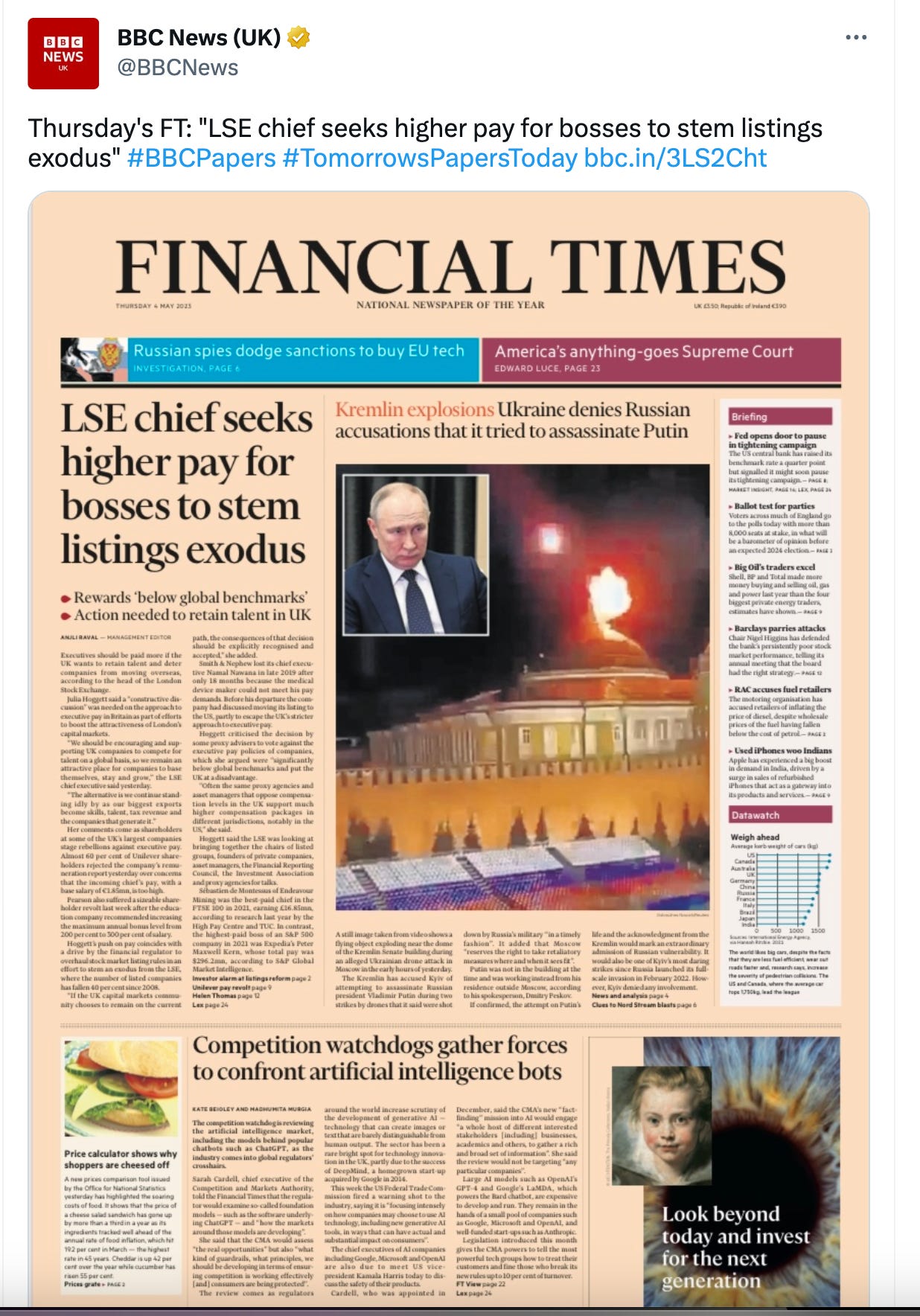Does the UK need to pay bosses more?
Debate on future of UK plc + Podcast + US banks + Other stories that matter
The chief executive of the London Stock Exchange has said there needs to be a “constructive discussion” about executive pay in the UK as the country debates how to attract and keep the best talent and businesses. The comments from Julia Hoggett have attracted plenty of headlines this week. The Financial Times splashed on the story with the headline: “LSE chief seeks higher pay for bosses to stem listings exodus.”
Hoggett made the comments in a blog post on the LSE website. She didn’t actually say that pay should be higher, but the inference is clear. This is what she wrote in full, with the key parts bolded by me:
“The objective of our capital markets is to support the creation of globally consequential companies in the UK to drive innovation, jobs and growth in the economy. Attracting and retaining domestic and international talent to create that value is something that UK-listed company boards and their executive leadership teams strive to do every day…
”And yet, very often, this talent objective is hampered by the advice and analysis of the proxy agencies and some asset managers voting against executive pay policies even when those pay levels are significantly below global benchmarks. Often the same proxy agencies and asset managers that oppose compensation levels in the UK support much higher compensation packages in different jurisdictions, notably in the US. This lack of a level playing field for UK companies is often not discussed, or if it is, the downside risks to our companies, our economy and our competitiveness are not part of the conversation…
”It is essential to have a constructive discussion with all stakeholders about a topic that tends to generate emotion and strong views. If the UK capital markets community chooses to remain on the current path, the consequences of that decision should be explicitly recognised and accepted. Together with the Capital Markets Industry Taskforce, the London Stock Exchange will bring together all sides of this discussion to hear the full range of perspectives and positions. This needs to be a ‘big tent’ conversation, with listed company Chairs, Founders of potentially listed companies, Asset Managers and Owners, the Financial Reporting Council, the Investment Association, other investee groups and the proxy agencies.“We are at a pivotal moment. We should be encouraging and supporting UK companies to compete for talent on a global basis, so we remain an attractive place for companies to base themselves, stay and grow. The alternative is we continue standing idly by as our biggest exports become skills, talent, tax revenue and the companies that generate it.”
This is punchy stuff. It was interesting to read comments from the chairman of AstraZeneca, the drug group, shortly after Hoggett’s blog was posted. He said that AstraZeneca was prepared to accept “major criticism” from shareholders and advisory groups to pay boss Pascal Soriot more to ensure he is not poached by a rival in the US. You can read the Financial Times story on that here.
In 2021 about 40 per cent of investors voted against AstraZeneca’s pay deal for executives. This was after the company proposed that Soriot could get an annual bonus worth 250 per cent of his base salary and long-term share awards worth 650 per cent of his salary.
Investors rebelled against the company despite shares AstraZeneca rising by more than 300 per cent since Soriot was appointed as chief executive in October 2012. The company is now worth £185 billion - making it the most valuable company in the UK. At least on this measure, Soriot has done a stellar job. He was paid £15 million last year. As the FT piece explains, Biogen, a US company which reportedly tried to poach Soriot, gave its new chief executive a signing-on bonus worth £24 million and pays a similar annual package to AstraZeneca. But AstraZeneca is five times larger than Biogen.
The intervention from Hoggett comes at an interesting time. Last week Microsoft and Activision heavily criticised the UK and said it was “closed for business” after the Competition and Markets Authority blocked a $68.7 billion takeover deal. We covered that here:
Is the UK closed for business?
The business story of this week has been the furious reaction from Microsoft and Activision Blizzard after the Competition and Markets Authority blocked their $68.7 billion video-game deal. Below is what Activision said after the CMA announced it would prevent Microsoft from buying the company. Lulu Cheng Meservey is the executive vice-president for cor…
Earlier this week the Financial Conduct Authority revealed a string of proposals to encourage more companies to list in the UK, including the scrapping of primary listings, which involve a company committing to higher standards of governance and disclosure, scrapping the need for a vote on related party transactions, removing the requirement for companies to have three years of audited accounts before listing, and allowing dual-class share structures, which mean founders can keep control of their company even if they own less than 50 per cent because the shares they hold have greater voting powers. You can read The Times story on that here.
There is opposition in the City to these proposals, as the FT reported here. Richard Buxton, UK equities manager at Jupiter, said:
“The whole thing is a degradation of hard-fought protections for shareholders, who are providing their capital to support companies…
“Allowing for changes such as dual-class shares is a massively backwards step. If it does attract companies without three years of audited accounts, for example, then there will be scandals and disasters.
“What we need to address this is not the eroding of shareholder rights but reform to develop savings for UK equities. Defined contribution schemes, for example, should be heavily invested in UK stocks.”
Matt Moulding, the founder and chief executive of THG, gave his own unique take on the proposals via LinkedIn. Manchester-based THG has had a tough time since floating in 2020 and shares in the online retailer are down 85 per cent…
Moulding went on to say in the post…
“And so maybe the key lesson we should take from the US isn’t more rule changes, but giving our regulator the resources to tackle the well-known bad actors using the LSE as their private piggy bank. Doubling both staff pay and the team at the FCA would be the best investment we could make in London.
”A regulator that protects Founders, Boards and Investors alike, instead of shielding Investment Bankers, Hedge Funds and Pundits, is what it takes to make the LSE attractive once again.
”Hey, but what do I know - other than being a customer of the LSE and the target market for city reforms.”
Moulding’s point about more resources for regulators was backed up by a report this week from the HM Crown Prosecution Service Inspectorate on the Serious Fraud Office. It said the SFO’s ability to get convictions is being hindered by low pay for temporary staff. The report said this issue “risks the effectiveness of case progression and the overall ability of the SFO to deal with its caseload”. The Times covered the report in more detail here.
The debate about pay in the UK is nothing new - there has been headlines about fat cats for years. But there appears to be a disconnect between the debate about pay and the ambition to boost the UK economy over the long-term and make the country an attractive place to set-up or float a business. Those ambitions require talented, unique individuals. The very nature of their talent means that their skills will be in-demand around the world and other countries or companies will be prepared to pay for them.
Debates about pay in the UK are often detached from whether the chief executive is doing a good job or not - look at AstraZeneca. And some criticism is not linked to the level of remuneration per se - it is about a company not getting rid of a poorly-performing chief executive, incentivising the wrong-type of behaviour, or rewarding a boss for events beyond their control - like an oil company benefitting from the rising price of oil. These are governance failings within a company. Failings that will eventually hurt them.
I was struck reading an interview with Charlie Munger, Warren Buffett’s business partner, in the Financial Times earlier this week. In the piece he said: “I would like my legacy to be a more relentless determination to develop and use what I call an uncommon sense.” Munger has expanded on this point before - his approach to investing is to focus on not making stupid decisions rather than making great decisions. One of the reasons for this, he has explained, is that it’s easier to work out why something has failed than it is to work out why something has succeeded because luck can play such a key role. As a consequence, he has said:
“My system in life is to figure out what’s really stupid and then avoid it.”
I would argue there is a clear lesson for the future of UK plc here - that not attracting the best people to jobs because you won’t pay them enough is a clear path to failure and therefore should be avoided.
Different fields in the UK outside business already recognise this. Look at the Premier League. While there may be discomfort about paying hundreds of thousands of pounds to footballers every week, the Premier League has established itself as the biggest in the world in terms of viewing figures and teams use their financial firepower to attract the best players in the world, such as Erling Haaland. According to this guide by Spotrac, which tracks contracts in sport, 27 players in the Premier League earn more than £10 million a year, with Kevin De Bruyne of Manchester City the top earner at £20.8 million. Data here.
The theme of attracting talent is also prevalent in Make Something Wonderful, a new book that includes emails, speeches and interviews by Steve Jobs. The book is superb (and free) and I have mentioned it in Off to Lunch before. It reveals how Jobs considered hiring talented people to be pivotal to the success of Apple and how, like Munger, he was obsessed about getting the basics right. These basics included hiring the right people, incentivising them properly and then getting out of their way so they could work…
In a speech to staff in September 1997 just after he returned to Apple, Jobs said:
“I’ve been back about eight to ten weeks, and we’ve been working really hard. What we’re trying to do is not something really highfalutin. We’re trying to get back to the basics. We’re trying to get back to the basics of great products, great marketing, and great distribution. I think that Apple has pockets of greatness but in some ways has drifted away from doing the basics really well.”
One of the first things Jobs did when he returned to Apple in 1997 was to introduce a generous share bonus scheme for staff that gave them a stake in the company - 16 per cent of the company’s shares were employee stock options. Jobs said in a message to staff:
“Stock options are egalitarian and they are the best way to give our employees a true stake in the company’s future success. And, we want our employees to be rewarded by the company’s success in the same way that our public shareholders are: through stock appreciation.”
In a speech to Stanford’s Graduate School of Business in 2003 he also spoke about the importance of hiring brilliant people:
“The most important lesson I ever learned was that you have to hire people better than you are….
“The first time I tried to build that organization—that was the Mac team. And it really worked. I saw a team of fifty people do something that literally hundreds, or thousands, of people at other companies couldn’t do. And so I’ve since then always tried to find really great people who love what they are doing and are extremely good at it. And sometimes they have experience, and sometimes they’re really young. They’re diamonds in the rough —and you hire them and take chances on them. But that’s been the most important lesson I’ve learned in business: that the dynamic range of people dramatically exceeds things you encounter in the rest of our normal lives — and to try to find those really great people who really love what they do. ”
You read the book in full here
Podcast…
Our latest episode of Business Studies looks at what businesses can really learn from sport. It features an interview with Catherine Baker, author of a new book called Staying the Distance: The lessons from sport that business leaders have been missing, and features insight from the New Zealand rugby union team, Dame Jessica Ennis-Hill, Sir Chris Hoy, and Mel Marshall, coach of Olympic gold medalist swimmer Adam Peaty. You can listen to the episode here.
A chart that helps you understand the world…
Concerns about regional banks in the US are mounting following the demise of Silicon Valley Bank, Signature Bank and First Republic.
The graph below shows PacWest, First Horizon and West Alliance over the last two years, as well as Wall Street giants JP Morgan and Goldman Sachs.
PacWest is blue, First Horizon is white, and Western Alliance is yellow. The two big banks remaining steady in the middle are JP Morgan in purple and Goldman Sachs in green, which demonstrates that they are yet to be hit by the same concerns…
A contrasting graph is the performance of the UK’s biggest housebuilders over the last year. Share prices in the sector have rebounded in 2023 amid signs that house prices may not fall as much as feared. Data published by Nationwide earlier this week showed house prices rose 0.5 per cent month-on-month in April and are down just 2.7 per cent year-on-year
The graph below shows how shares in Barratt Developments (purple), Taylor Wimpey (white), Persimmon (yellow), Bellway (purple) and Vistry (green) bottomed out around October when Liz Truss was prime minister. However, they have gained ground since and three of the companies are actually above where they were a year ago…
You should also read this…
Harry Wallop has written in The Times about why the UK is wrong to obsess about creating unicorns and how it can lead to “focusing on the merits of scaling up an idea rapidly rather than long-term sustainability, profitability or actually creating a really great business”. He concludes by saying: “We run the risk that we care only about valuation, not value-creation.” (The Times)
A fascinating piece from Simon Kuper on how cities are not as overpopulated as you think and that local authorities need to prioritise using space more efficiently. He proposes taxing second homes, ensuring that Airbnb properties are rented out 365-days-a-year or that someone actually lives in them outside holiday periods, using school playgrounds at weekends, turning office receptions into cafes outside working hours, and getting rid of car-parking spaces (Financial Times)
Construction of a new spaceport in the Scottish highlands has begun. The Sutherland Spaceport has secured £14.6 million of public funding (BBC)
Legal & General is closing a factory in Selby, Yorkshire that made modular homes. L&G blamed the move on Covid-19 and long planning delays. Modular homes are modern prefabs that are built in a factory before being delivered to their location. It had been hoped that modular homes could be used to overcome the housing shortage in the UK. 475 jobs are at risk (Sky News)
Small and medium-sized businesses are more optimistic about their prospects than they were a year ago despite the economic uncertainty, according to a survey of nearly 12,000 businesses by Sage. Businesses in the UK were the most optimistic of the nine countries surveyed (Sage)
Norse Atlantic Airways has launched low-price transatlantic flights from Gatwick. It could have more success than rival Norwegian, which scrapped long-haul flights due to financial problems. Norse has cash on its balance sheet, is leasing Boeing 787 Dreamliners at half the price that Norwegian did, and insists it won’t over-expand (Telegraph)
This feature is from last weekend but is worth your time if you haven’t read it yet: a book extract on the tortured genius that is Ronnie O’Sullivan (The Times)
Executives in the US are getting advice from ChatGPT on how to communicate with staff - with mixed results (Wall Street Journal)
Interesting piece from retail boss Ian Shepherd on the practical uses and limitations of AI for businesses, specifically using it to model data. He writes: “There are a range of ways that the creation of the model can go wrong - the process is as much art as it is science - including choosing the wrong variables to include, failing to test the model on new data (so you build one which is brilliant at explaining the sample data but has no predictive value) and many more.” (Moving Tribes)
Gen Z would rather work for Raytheon, Nike, Toyota or Lockheed Martin than any of the big tech or Wall Street companies according to this CNBC report (CNBC)
And finally…
There will be no Off to Lunch again on Monday due to the bank holiday but there is some bonus content on the way to make-up for the collection of public holidays we get this month. In the meantime - enjoy the coronation, enjoy any street parties you are having or enjoy your alternative plans if you plan to miss the Royal ceremony…
Thanks for reading. If you enjoy Off to Lunch then please share it with others and spread the word. If this newsletter was shared with you then please sign-up below to become a member, get Off to Lunch sent directly to your inbox, attend our forthcoming events and contribute to the work of Off to Lunch
Best
Graham











